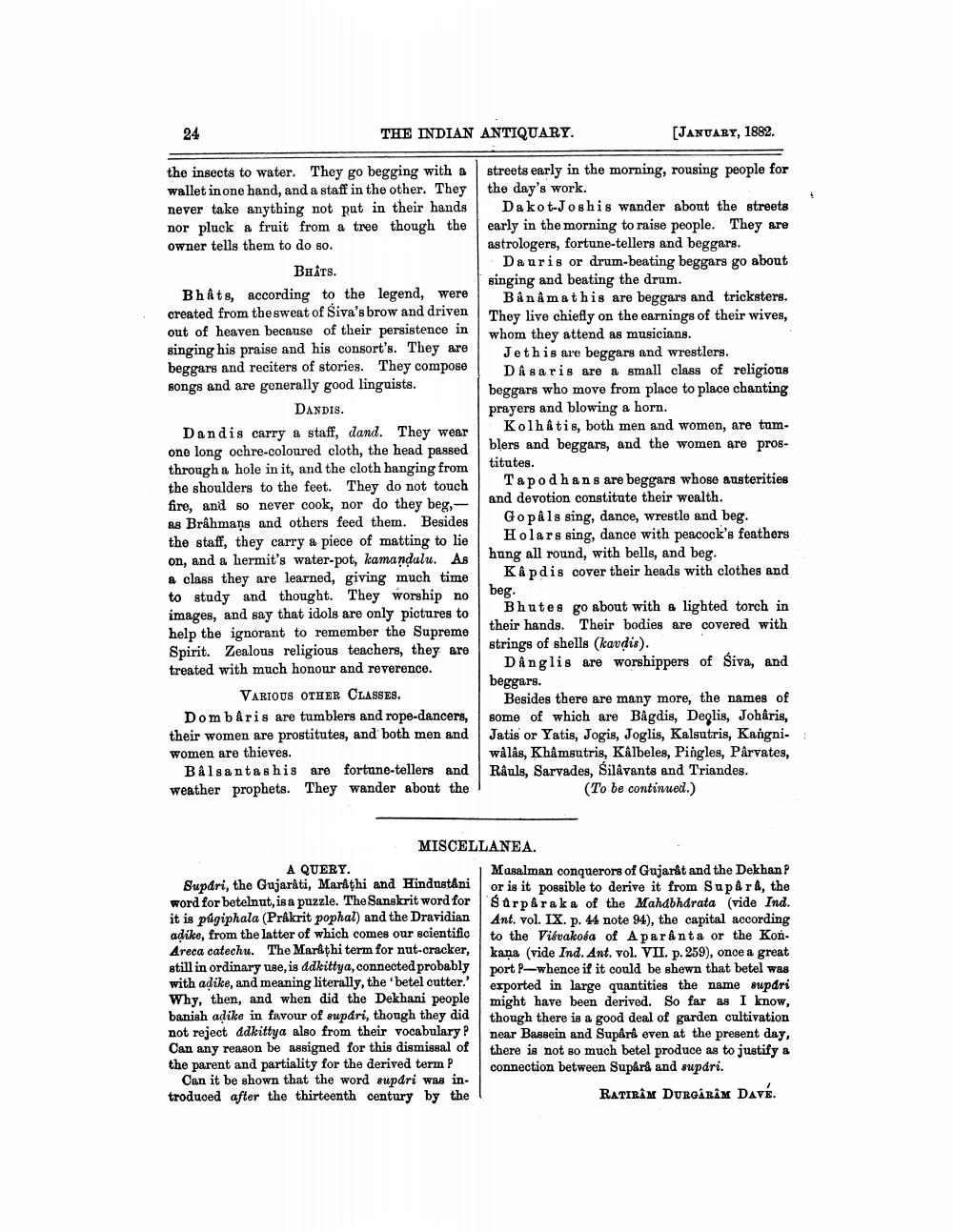________________
THE INDIAN ANTIQUARY.
(JANUARY, 1882.
the insects to water. They go begging with a wallet in one hand, and a staff in the other. They never take anything not put in their hands nor pluck a fruit from a tree though the owner tells them to do so.
BHÂTS. Bhâts, according to the legend, were created from thesweat of Siva's brow and driven out of heaven because of their persistence in singing his praise and his consort's. They are beggars and reciters of stories. They compose songs and are generally good linguists.
DANDIS. Dandis carry a staff, dand. They wear one long ochre-coloured cloth, the head passed through a hole in it, and the cloth hanging from the shoulders to the feet. They do not touch fire, and so never cook, nor do they beg, - as Brâhmans and others feed them. Besides the staff, they carry a piece of matting to lie on, and a hermit's water-pot, kamandulu. As a class they are learned, giving much time to study and thought. They worship no images, and say that idols are only pictures to help the ignorant to remember the Supreme Spirit. Zealous religious teachers, they are treated with much honour and reverence.
VARIOUS OTHER CLASSES. Dom baris are tumblers and rope-dancers, their women are prostitutes, and both men and women are thieves.
Bálsantas his are fortune-tellers and weather prophets. They wander about the
streets early in the morning, rousing people for the day's work.
Dakot-Joshis wander about the streets early in the morning to raise people. They are astrologers, fortune-tellers and beggars.
Dauris or drum beating beggars go about singing and beating the drum.
Bânâ mathis are beggars and tricksters. They live chiefly on the earnings of their wives, whom they attend as musicians.
Jethis are beggars and wrestlers.
Dasaris are a small class of religious beggars who move from place to place chanting prayers and blowing a horn.
Kolhâtis, both men and women, are tumblers and beggars, and the women are prostitutes.
Tapod hans are beggars whose austerities and devotion constitute their wealth.
Gopals sing, dance, wrestle and beg.
Holars sing, dance with peacock's feathers hung all round, with bells, and beg.
Kåpdis cover their heads with clothes and beg.
Bhutes go about with a lighted torch in their hands. Their bodies are covered with strings of shells (kavdis).
DAnglis are worshippers of Siva, and beggars.
Besides there are many more, the names of some of which are Bagdis, Deglis, Johåris, Jatis or Yatis, Jogis, Joglis, Kalsutris, Kangni. wàlás, Khâmsutris, Kålbeles, Pingles, Pârvates, Râuls, Sarvades, Silâvants and Triandes.
(To be continued.)
MISCELLANEA. A QUERY
Masalman conquerors of Gujarat and the Dekhan Sundri, the Gujarati, Marathi and Hindustäni or is it possible to derive it from Supard, the word for betelnut, is a puzzle. The Sanskrit word for
Sarparaka of the Mahabharata (vide Ind. it is púgiphala (Prakrit pophal) and the Dravidian
Ant. vol. IX. p. 44 note 94), the capital according adike, from the latter of which comes our scientific
to the Visvakona of Aparanta or the KonAreca catechu. The Markthi term for nut-cracker,
kaņa (vide Ind. Ant. vol. VII. p. 259), once a great still in ordinary use, is ddkittya, connected probably
port P-whence if it could be shown that betel was with adike, and meaning literally, the 'betel cutter.'
exported in large quantities the name supari Why, then, and when did the Dekhani people might have been derived. So far as I know, banish adike in favour of supari, though they did though there is a good deal of garden cultivation not reject ddkittya also from their vocabulary PI
near Bassein and Supara even at the present day, Can any reason be assigned for this dismissal of there is not so much betalnroduce as to inatifs a the parent and partiality for the derived term ? connection between Supard and supari.
Can it be shown that the word supari was in. troduced after the thirteenth century by the
RATIRẦM DURGARÂM Dave.




